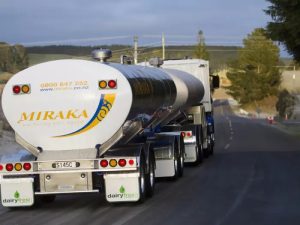
China is becoming increasingly important for Fonterra, accounting for 46 per cent of the pre-tax profit in its three geographic markets in the first-half year, up from 35 per cent the year earlier.
Demand for dairy in China is growing as consumers seek better nutrition in their diets as they become wealthier and as health awareness rises after Covid-19.
That’s causing a spike in Chinese milk prices and prompting local companies to turn to cheaper imported milk powder from more efficient producers like New Zealand to keep up with demand, says S&P Global Ratings associate director Flora Chang.
Fonterra chief financial officer Marc Rivers agrees that China won’t be able to meet increased demand for dairy through its local production any time soon.
“We think that China will be a net importer of dairy for a very long time, and as long as they are importing dairy, then we want to be the exporter for that,” he said. “China is a very important market for us, and I think it always will be.”
China is the largest trading partner for New Zealand and Australia. But Australian exporters have been hurt by a political spat, which has seen tariffs and restrictions placed on Australian barley, wine, meat, cotton, wood, coal and lobsters.
New Zealand has taken a more cautious approach to any disagreements with China, mostly refraining from public criticism and raising any concerns directly.
The New Zealand Government’s approach to China and the quality of New Zealand dairy products lessens the risk of trade tensions impacting the cooperative, according to Sam Playfair, an analyst who covers Fonterra for S&P Global Ratings in Melbourne.
“It’s obviously a very strategically important market for Fonterra,” Playfair said.
“It’s something we have been speaking to the management team about since the beginning of last year when Australia found itself in some pretty significant trade tensions.
“The most important thing to note there is that New Zealand seem to have extracted themselves from this particular trade tension on our side of the ditch,” he said.
“The New Zealand Government is obviously approaching it slightly differently to the Australian Government.
“We don’t see any near term pressure or danger there for Fonterra but obviously as the situation evolves and if New Zealand did get dragged in, then we have got to address those issues as they present themselves.”
It was certainly something the ratings agency was monitoring, “but there is nothing that is giving us immediate concerns.”
Playfair noted that tariffs had been placed on Australian commodities that were relatively easy to substitute. Iron ore, which was in demand in China and was Australia’s largest export to the country, was so far unaffected.
The quality of New Zealand dairy products was hard to replicate, giving Fonterra a significant competitive advantage globally, Playfair said.
Rivers said Fonterra was used to dealing with geopolitics, and as an important part of the economy the company was in close contact with the New Zealand Government, sharing information and ensuring they were all well-informed.
“For all the markets that we have, there’s always degrees of geopolitical risk that we have to consider, but the best way to manage that is to be a good, reliable supplier, and what we are supplying is something that’s very beneficial, it’s good high-quality nutrition,” Rivers said.
“So long as we are doing that and being seen as a reliable supplier, I think that’s the best way to manage any kinds of risks.”
The cooperative took a collaborative approach, he said.
“It’s important that we are seen as being constructive, and not just wanting to take cash out. That sort of mindset is important,” he said.
Fonterra has invested in developing farms in China but as part of its retreat from global expansion, it’s selling its farming interests and its investment in Chinese infant formula maker, Beingmate, this year.
Rivers said the cooperative had invested more than $1 billion in the farms and helped raise the quality of local milk supply in China, which was viewed positively by Chinese authorities.
“They are operating very well now, and whether we own them or whether someone else owns the farms doesn’t matter really as long as they exist for the benefit of the Chinese consumer and that’s the case. So I think we are given credit for that contribution,” he said.
The fact that New Zealand has been open to investments in both directions was also important, and set us apart from some other countries, he said.
“For any country, you want to see that someone who is doing business with you is also committed to you locally,” he said.
Rivers said the cooperative is confident it can replicate the success it’s had in China in its other markets, which were more impacted by Covid-19 in the first half of its financial year.
























